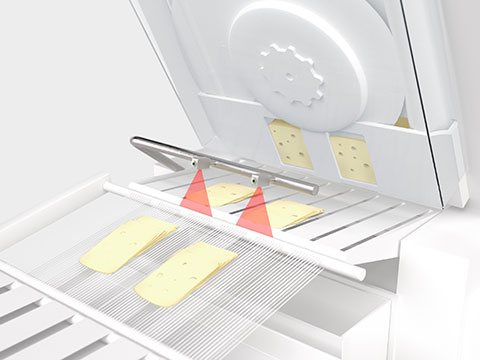
Posted to News on 17th Jan 2024, 11:30
Sensors for applications where absolute hygiene is crucial
Hygiene-sensitive production and packaging processes require sensors that meet the most stringent requirements. Leuze makes this possible with sensor series intended for the food industry and with its many years of application know-how.

There are few industries where the demands placed on the sensor systems are as great as they are in the food industry. Whether sausage or cheese, confectionery or pastries, dairy or beverages, hygiene is always a key factor when processing and packaging the products. Sensors in these areas must be resistant to intensive cleaning and disinfection cycles. The technology must also be able to withstand considerable fluctuations in temperature.
With its new miniature sensors in stainless steel housings, Leuze fulfils all the important requirements of the food industry: chemical and thermal resistance, leak tightness and a hygienic product design.
Protection classes such as IP67, IP68 and IP69K as well as ECOLAB, CleanProof+ and JohnsonDiversey certifications confirm that the devices operate properly at all times even in extremely harsh environments.
In the food industry, hygiene requirements are most strict wherever the food product or beverage is not yet protected by primary packaging. This places high demands on sensors that are used for automation in these areas, says Steffen Hundt, product manager at Leuze. Sensor systems must be high performance and hygienic, but also robust so that they can operate reliably in harsh environmental conditions. With its new solutions, Leuze ensures the following four key requirements for sensor systems used in the food industry:
Chemical requirements: high resistance Cleaning plays a major role in the packaging area of the food industry. Intensive cleaning processes, particularly after production runs, are necessary in order to remove food residue and to prevent bacterial carry-over. There are many cleaning cycles, long exposure times as well as preliminary and main cleaning.
Furthermore, the sensor systems must be able to deal with a broad range of different cleaning agents from ECOLAB cleaners to various foam and disinfectant cleaners that may be acidic or alkaline. To make sure that the sensors optimally withstand the cleaning agents, Leuze checks the devices using the ECOLAB test and also CleanProof+ and Johnson Diversey procedures. This ensures the long-term resistance of the sensor housing.
Thermal requirements: major differences in temperature Major differences in temperature exist particularly when food is placed in its primary packaging. For example, owing to the sensitive foodstuffs handled in meat processing, the temperatures often range from 5 to 10C. In contrast, however, cleaning is performed at extremely high temperatures.
Here, we again play it safe with our sensors and always test the products in several ways: in the climate chamber, by thermal shock testing and also by means of a steam jet test, explains Hundt.
Leak tightness: reliably waterproof As the sensors are exposed to continuous wet conditions and humidity during cleaning and because high-pressure water jets are additionally used, absolute leak tightness is essential. Leuze always tests all sensors using leak testing equipment.
The sensors intended for the food industry meet the demands required for IP69K approval: they are tested using a steam jet with an extremely high water pressure of up to 10,000 kPa and a temperature of up to 80 C. The distance to the sensor during testing is very close at just ten centimetres. Furthermore, the sensor is exposed to the steam jet from different angles in order to simulate cleaning as realistically as possible.
Materials/product design: hygienic and food-safe Sensors installed in packaging machines should be made of material that is approved for contact with food. Furthermore, the devices must be designed in such a way that they can be cleaned easily. In addition, no bacteria and no food residue are allowed to accumulate. For this reason, smooth surfaces without gaps and cavities are required.
Leuze meets these requirements by implementing a hygienic product design and using selected FDA-compliant materials. This means that Leuze sensors for the food industry have a stainless steel housing as well as glass-free and scratch-resistant optics covers.
Precise and robust at the same time
The requirements make it clear that suitable sensor systems are needed for hygiene-sensitive production and packaging processes. Leuze has specially developed the 53C and 55C sensor series for this purpose. They are characterized by the housing made of high-quality, particularly smooth V4A stainless steel and the glass-free, scratch resistant optics cover. The sensors can thus withstand demanding cleaning and disinfection cycles as well as large temperature fluctuations.
Leuze has developed the sensors of the 53C and 55C series especially for hygiene-sensitive production and packaging processes. They can be used very flexibly as through beam photoelectric sensors, retro-reflective photoelectric sensors or diffuse sensors. Depending on the model, Leuze solutions reliably detect glass, PET, film or small parts. The fill level of aqueous liquids can also be easily detected.
The 53C and 55C sensor series are dustproof and waterproof and meet the requirements of protection classes IP67, IP68 and IP69K. The housing is consistently designed to prevent bacterial carry-overs and contamination. Smooth contours without fastening holes prevent deposits. A special fastening concept of the 53C series in hygienic design also contributes to this the sensor and the machine have a gastight connection via the mounting trunnion.
Want the latest machine building news straight to your inbox? Become a MachineBuilding member for free today >>
1B Fenice Court
Phoenix Park
Eaton Socon
PE19 8EW
UNITED KINGDOM
+44 (0)1480 408500

















